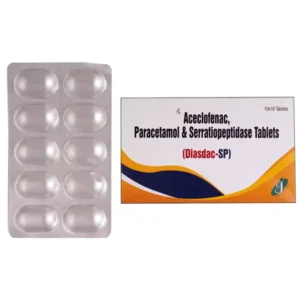ACECLOFENAC + SERRATIOPEPTIDASE
Aceclofenac: Aceclofenac is a non-steroidal anti-inflammatory drug (NSAID) that is used to alleviate pain and reduce inflammation in a variety of conditions, including rheumatoid arthritis, osteoarthritis, ankylosing spondylitis, and other musculoskeletal disorders.
The drug works by inhibiting the activity of the enzyme cyclooxygenase (COX), which is responsible for the production of prostaglandins, the chemicals that cause pain, swelling, and inflammation. By blocking the production of prostaglandins, Aceclofenac helps to relieve pain and reduce inflammation.
The recommended dose of Aceclofenac varies depending on the condition being treated and the severity of symptoms. Generally, the initial dose is 100 mg twice daily, and it can be increased up to 200 mg twice daily if necessary. However, it is important to follow the instructions of a healthcare professional, as they will determine the appropriate dose for each individual.
As with any medication, Aceclofenac may have some potential side effects. The most common ones include gastrointestinal complaints, such as abdominal pain, indigestion, nausea, vomiting, and diarrhea. It may also cause dizziness, headache, skin rash, itching, elevated liver enzymes, and fluid retention. In rare cases, it can lead to serious side effects such as gastrointestinal bleeding, ulcers, or perforation.
It is important to note that Aceclofenac is contraindicated in individuals with a history of allergy or hypersensitivity to any NSAID, as well as those who have experienced asthma, allergic-type reactions, or excessive bleeding when taking NSAIDs. It should also be used with caution in individuals with a history of gastrointestinal disorders, liver or kidney disease, high blood pressure, or heart problems.
As with any medication, it is recommended to consult with a healthcare professional before starting Aceclofenac and to report any unusual or severe side effects. They will be able to determine if this drug is suitable for an individual based on their medical history and other medications they may be taking.
Serratiopeptidase: Serratiopeptidase is an enzyme derived from bacteria called Serratia spp. It is commonly used as a proteolytic or protein-digesting enzyme.
Serratiopeptidase is mainly prescribed to promote the reduction of pain, inflammation, and swelling associated with various conditions such as arthritis, trauma, surgery, sinusitis, and bronchitis. It is also used to facilitate the healing of wounds and injuries.
The mechanism of action of serratiopeptidase involves its ability to break down proteins, which helps to reduce inflammation and promote the removal of dead tissue. It is believed to have anti-inflammatory, analgesic, and fibrinolytic properties, meaning it can dissolve blood clots.
The dose of serratiopeptidase can vary depending on the specific condition being treated. However, the typical recommended dose for adults is usually 10-30 mg taken orally 1-3 times per day. It is important to follow the instructions provided by your healthcare provider or the instructions on the product label.
Some common side effects of serratiopeptidase can include gastrointestinal discomfort such as nausea, vomiting, diarrhea, and stomach pain. In rare cases, allergic reactions can occur, resulting in symptoms like rash, itching, swelling, dizziness, and difficulty breathing. If you experience any severe or persistent side effects, it is important to consult your healthcare provider. It is also essential to be aware of possible drug interactions, so always inform your doctor about any other medications or supplements you are taking before starting serratiopeptidase.


